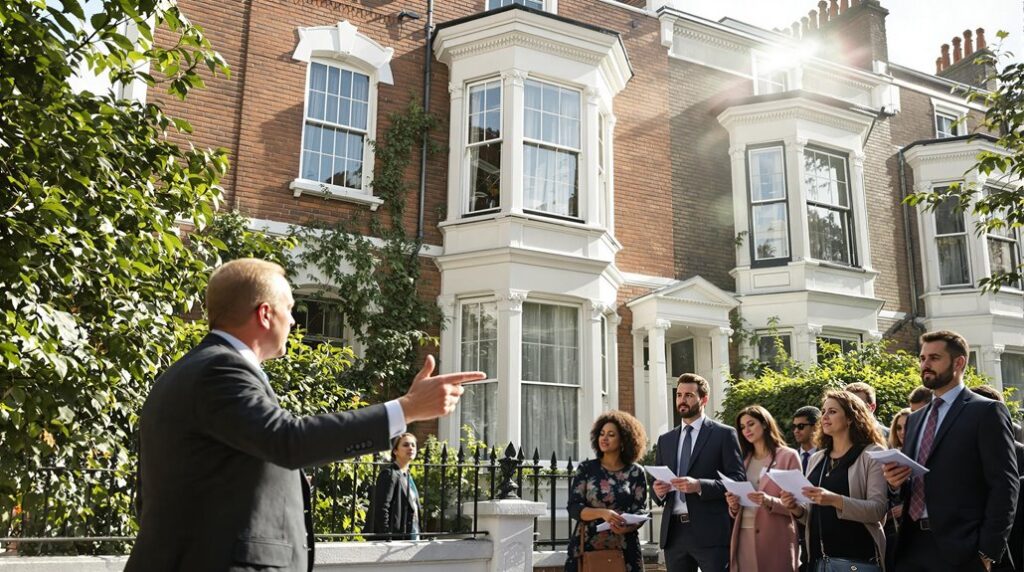I’ve guided countless homeowners through property auctions, and I can tell you that selling your house this way isn’t just about showing up on auction day. You’ll need to navigate legal paperwork, set strategic pricing, and understand binding contracts that differ drastically from traditional sales. The 7-8 week timeline might seem straightforward, but there’s a specific sequence of critical decisions that’ll determine whether you’ll maximize your sale price or walk away disappointed.
Key Takeaways
- House auctions take 7-8 weeks from instruction to completion, with 4 weeks preparation and 3 weeks marketing.
- Legal packs must include title deeds, property searches, and sale conditions prepared meticulously by solicitors.
- Set guide prices 10% below reserve price to attract bidders while keeping reserve at 80-90% market value.
- Market through multiple channels including digital advertising, professional photography, and pre-auction open houses for maximum exposure.
- Winning bidders pay 10% deposit plus £1,500 buyer’s fee within 24 hours, with completion required within 20 days.
Understanding the Property Auction Process and Timeline
When you’re selling your house at auction, understanding the timeline becomes essential since the entire process operates on strict deadlines that can’t be extended once set in motion.
The complete journey from instruction to completion typically takes 7-8 weeks. You’ll need approximately 4 weeks for pre-auction preparation, where I’ll guide you through catalog entry deadlines and legal pack preparation. This includes gathering title deeds, searches, EPC certificates, and property information forms. You’ll sign auction terms 4 weeks before auction day, formalizing your reserve price and fees. It’s crucial to ensure that your property is structurally sound to avoid any unexpected issues during the sale, particularly if there are signs of subsidence issues that need to be addressed beforehand.
Marketing efforts begin 3 weeks before auction day, with your property benefiting from extensive marketing through online advertising, printed catalogues, and newspaper advertisements to maximize bidder interest.
Once bidding concludes, traditional auctions compress exchange and completion into 28 days, while modern auctions span 56 days total. There’s no sale chain involved, eliminating gazumping risks and accelerating your transaction considerably compared to conventional property sales.
Preparing Your Property and Legal Documentation for Auction
The auction process demands meticulous preparation of both your property’s physical presentation and detailed legal documentation well before bidding commences. I’ll guide you through essential steps that’ll maximize your sale potential.
First, you’ll need to prepare thorough legal packs containing title deeds, property searches, and sale conditions. Your solicitor must compile these documents meticulously, ensuring all planning permissions and restrictive covenants are disclosed. Don’t overlook special conditions that might deter buyers. Additionally, be aware of any hidden costs that could arise during the sale, which may affect your overall profit.
Property presentation matters greatly. Consider minor repairs and deep cleaning to enhance visual appeal. Professional photography showcases your home’s best features in auction catalogs. Pay attention to how your property’s location and condition will be perceived against the guide price you’re hoping to achieve.
Schedule structural surveys if requested by serious bidders. Transparency builds confidence and prevents post-auction complications. Remember, auction sales are legally binding immediately upon hammer fall, so thorough preparation protects both parties throughout this accelerated process.
Setting Competitive Guide and Reserve Prices

Understanding how to set competitive guide and reserve prices will determine your auction’s success more than any other factor. I’ll guide you through this essential process step by step.
Your reserve price is the confidential minimum you’ll accept – typically 80-90% of market value. This protects you from underselling while staying realistic about market conditions. Additionally, determining your property’s true value based on local market conditions can significantly influence your pricing strategy. The guide price advertises your property’s expected range, usually set 10% below your reserve.
Current regulations require your reserve stays within 10% above a single guide price, or within the advertised range for price brackets. You can adjust your reserve right up to auction day. Lower guide prices attract more inquiries, viewings, and downloads of legal packs, increasing potential buyer engagement and competition on auction day.
Set your reserve as low as possible to attract more bidders – this competitive tension often drives final prices higher than conservative reserves would achieve.
Marketing Strategies and Bidder Registration Requirements
Success in property auctions depends heavily on executing a thorough marketing strategy that attracts qualified bidders while establishing clear registration protocols.
I’ll deploy multiple channels to maximize your property’s visibility. Digital advertising through paid search ads targets buyers actively seeking auction properties, while social media campaigns reach specific demographic segments. I’ll feature professional high-resolution photographs showcasing key areas like kitchens and curb appeal, paired with accurate descriptions emphasizing location and investment potential. Additionally, understanding property pricing factors can greatly enhance your marketing approach, ensuring potential bidders recognize the value of your home.
Traditional methods remain effective—I’ll distribute print materials locally and install eye-catching signboards at high-traffic locations. Pre-auction open houses generate hands-on interest. These viewing events create a competitive environment that helps establish fair market value for your property.
For bidder registration, I’ll require ID verification and collect refundable deposits (typically 10% of guide price) to guarantee legitimate participants. Clear communication about auction terms, buyer premiums, and payment timelines prevents contractual disputes.
Completion Procedures and Post-Auction Obligations

Once the auctioneer’s hammer falls, you’ll face immediate obligations that demand swift action and precise execution. You must pay the 10% deposit immediately, plus the buyer’s fee of £1,500 within 24 hours. There’s no cooling-off period—contracts become legally binding instantly.
Your solicitor will handle the technical transfer process, coordinating with the buyer’s legal team for completion within 20 working days. You’ll receive the balance after deducting auction fees upon completion. The entire process typically takes six weeks from listing to final transfer.
As a seller, you must guarantee the property is vacant by completion date and cooperate fully with the transfer process. Having expert legal assistance throughout this chain-free approach provides certainty and speed that traditional sales can’t match.
Conclusion
I’ve covered the essential steps for selling your house at auction—from understanding the 7-8 week timeline to preparing documentation, setting competitive prices, and managing post-auction obligations. You’ll need proper legal support, effective marketing, and realistic pricing to attract bidders. If you’re ready for a swift property sale and can handle the process’s demands, auction selling offers a compelling alternative to traditional estate agent routes in today’s UK market.
References
- https://www.cliveemson.co.uk/news/how-does-a-property-auction-work-7-steps-to-auction-success/
- https://www.homesellingexpert.co.uk/guides/how-to-auction-a-house
- https://www.propertymark.co.uk/professional-standards/consumer-guides/buying-selling-houses/buying-property-at-auction.html
- https://www.mfsuk.com/blog/how-online-property-auctions-work/
- https://hoa.org.uk/advice/guides-for-homeowners/i-am-buying/how-to-buy-a-house-at-auction/
- https://auction-link.org.uk/property-auction-sale-process/
- https://theauctionexperts.co.uk/blog/exchange-and-completion-timelines-in-the-modern-method-of-auction-what-sellers-need-to-know
- https://www.unbiased.co.uk/discover/mortgages-property/selling-a-home/how-to-sell-your-house-at-auction
- https://www.cliveemson.co.uk/news/how-long-does-it-take-to-sell-at-auction/
- https://www.firstforauctions.co.uk/news/how-prepare-your-first-property-auction

